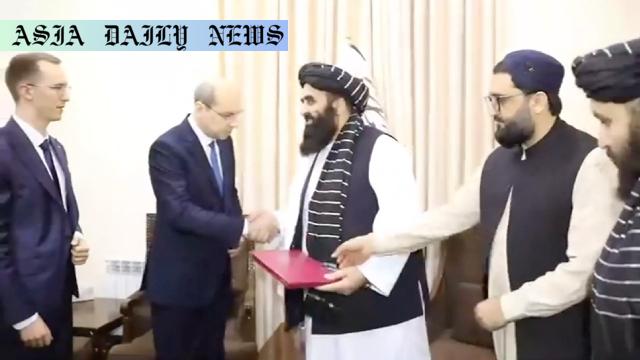Taliban Government: Russia recognizes Afghanistan’s interim Taliban-led administration, paving the way for global collaboration.
Russia becomes the first nation to officially recognize the Taliban government.
The recognition aims to foster economic, agricultural, and counterterrorism collaboration.
Russia lauds its decision as an example for other nations despite global hesitance.
Taliban expresses gratitude and pledges to maintain balanced foreign relations.

Introduction: A Historic Step by Russia
Russia has taken a significant and controversial step by becoming the first country to officially recognize Afghanistan’s Taliban-led interim government. This decision, which marks a notable shift in global diplomacy, was announced by Russia’s state-run Tass news agency, highlighting a move towards enhanced bilateral cooperation. The development comes after years of strained relations and Russia’s previous designation of the Taliban as a terrorist organization. This landmark decision raises questions about the geopolitical implications and its potential ripple effects on international relations.
The Motivation Behind the Recognition
The decision to recognize the Taliban government is rooted in Russia’s strategic interests. The Russian foreign ministry emphasized that the recognition will enable productive cooperation in critical sectors such as economic development, energy, and agriculture, while also addressing security concerns such as terrorism. Given Afghanistan’s geopolitical location and its potential as a trade corridor, Russia’s recognition signals a calculated move to enhance its influence in Central and South Asia. By fostering ties with the Taliban, Russia aims to secure a foothold in Afghanistan’s rebuilding and economic restructuring efforts.
Global Concerns: Rights Violation and Political Ramifications
Despite Russia’s move, global apprehension toward recognizing the Taliban persist. Western nations and other governments have refrained from acknowledging the Taliban regime due to its human rights record, particularly its treatment of women. The regime continues to face criticism for its restriction on women’s education and employment opportunities. Russia’s decision, therefore, poses the question of whether economic and security interests can overshadow humanitarian considerations. Analysts believe that this step could give way to a ripple effect, urging other nations to rethink their stance on engaging with the Taliban, even if they do not offer formal recognition.
Taliban’s Response to Russia’s Move
The Taliban, on its part, has extended a warm welcome to Russia’s recognition. In a video message, Taliban’s foreign minister Amir Khan Muttaqi expressed gratitude, calling Russia’s decision a ‘courageous step’ and an inspiring precedent for other nations. Muttaqi reiterated the Taliban administration’s commitment to developing balanced foreign relations. This acknowledgment not only strengthens diplomatic ties between the two nations but also lends a sense of legitimacy to the Taliban on the international stage, a prospect they have been seeking since taking over power in 2021.
A Broader Perspective: Geopolitical Implications
Russia’s recognition of the Taliban government is likely to alter the geopolitical equilibrium. Countries like China, Pakistan, and Iran, who have been more amenable to engaging with the Taliban without formal recognition, might now reconsider their stance. This move could also place pressure on Western nations to reassess their policies on engaging with Afghanistan, especially concerning critical challenges such as terrorism and humanitarian aid. Meanwhile, critics argue that legitimizing the Taliban could embolden them further, delaying essential reforms and concessions in areas like human rights and governance.
Conclusion: The Road Ahead
Russia’s recognition of the Taliban government marks a pivotal moment in international relations, and its implications will unfold over time. While this decision underscores Russia’s strategic calculations and its readiness to diverge from Western stances, it also brings to the forefront pressing ethical concerns surrounding rights violations. As nations closely monitor the unfolding circumstances, the world waits to see whether other countries will follow Russia’s lead or maintain their distance from the Taliban’s regime.



Commentary
Russia’s Bold Step Sets a New Diplomatic Tone
Russia’s decision to officially recognize the Taliban government marks a critical juncture in global politics. On one hand, it reflects Russia’s assertive attempt to carve a prominent role in shaping Afghanistan’s future. On the other, it brings forth major ethical quandaries, especially concerning human rights violations under the Taliban regime. This moment calls for a delicate balance between fostering economic ties and pressing for necessary reforms in governance and societal norms within Afghanistan.
Strategic Calculations vs Humanitarian Concerns
The recognition serves as a strategic maneuver for Russia, allowing it to strengthen its presence in South and Central Asia. Economic cooperation, particularly in energy and agriculture, can foster mutual benefits for both nations. However, this recognition may also inadvertently legitimize the Taliban’s ideologies and governance methods, which remain highly contested globally due to their regressive policies, especially toward women’s rights. It is imperative for Russia to ensure that its agenda goes beyond economic interests to include calls for human rights improvements in Afghanistan.
Potential Ripple Effects on Global Diplomacy
Russia’s recognition may also serve as a litmus test for other nations contemplating their stance toward the Taliban. If geopolitical considerations and economic incentives overshadow humanitarian concerns, a precedent might emerge that prioritizes strategic interests over ethical considerations. Nations cautiously observing Russia’s move must weigh the long-term ramifications of such recognition. Will it encourage other countries to resume dialogue with the Taliban, or will it spur resistance to conceding legitimacy in the face of continued human rights violations?
Final Thoughts: A Precarious Path
While Russia’s decision undeniably opens up new avenues for relationships with Afghanistan, it also places a considerable burden on the international community to balance progress with accountability. This moment demands clear, strategic foresight to manage the multi-faceted challenges at hand. Engaging with the Taliban requires a nuanced approach that combines diplomatic recognition with unwavering advocacy for reforms and global norms, ensuring that economic cooperation does not come at the cost of human dignity.